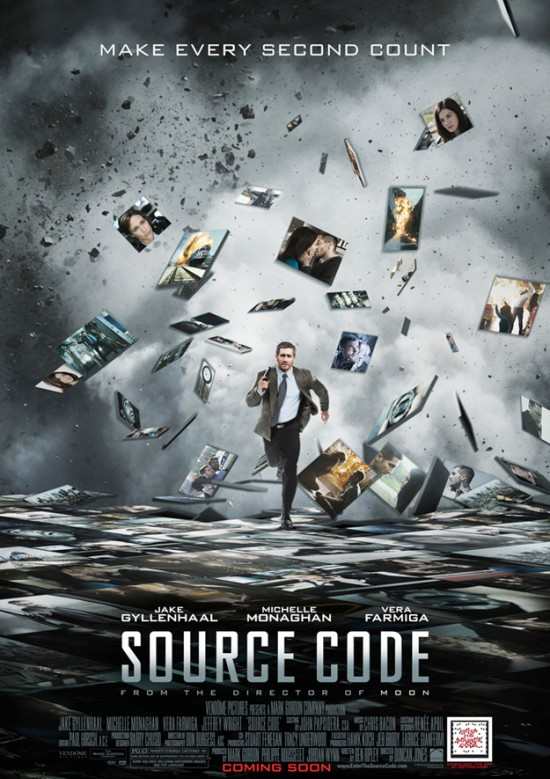Source Code
/
Duncan Jones's latest film, Source Code, is an interesting film that avoids any major sophomore slump, and demonstrates that Jones is a competent, story-driven director. His first major film, Moon, won me over with its story and characters, and while this latest foray has its flaws, they are merely superficial.
Source Code opens with a train, where a man, Captain Coulter Stevens (Jake Gyllenhaal), abruptly awakens and is faced with unfamiliar surroundings as a woman (he only learns later that her name is Christina Warren, played by Michelle Monaghan) says that she took his advice. His confusion mounts as he realizes that he’s in a different body altogether, before being blown apart by a bomb planted on the train. He abruptly wakes up again, this time in a small capsule, with a video of an Air Force captain, Colleen Goodwin (Vera Farmiga), who tells him that he’s on a mission to find out where the bomber is, and to stop another bombing in Chicago. So begins a Groundhog’s Day-esque series of events where Stevens enters another man’s last 8 minutes (Sean Fentress, who died in the bombing earlier that day) and works to find the bomber and the bomb.
The science fiction element here comes with the Source Code, which uses quantum entanglement to access the last eight minutes of a person’s life (described as an afterglow, akin to a light bulb), and essentially places the subject into a parallel version sidestep of the world, where he’s able to uncover information about the world around him as he seeks out the bomber. The story, much like the idea of separate worlds and time-paths, splits off in its focus, and to Jones’ credit, he juggles the themes (I’d hesitate to say stories, because they’re all part of the story) fairly well together.
The execution isn’t perfect – there’s points where the film feels a little forced, such as when we’re shown Stevens coming and going from the worlds multiple times, but the overall effect works – there’s plenty of tension, and several twists as the story changes in the last act. Looking back, the story isn’t so much a terrorist hunt as it is a man struggling for his mission when all of the choices available to him have been limited. Stevens finds himself in an impossible situation, one where he has to struggle for context when he has none. As science fiction author William Gibson noted: “The people who complain about Source Code not getting quantum whatsit right probably thought Moon was about cloning”. The same thing holds true for the counterterrorism element to the story here: this isn’t a film about an action hero tracking down the back guy: it’s the story of how someone accomplishes his mission, and the stakes that that mission might hold. Execution issues aside, this is a film that is really as thoughtful as Moon was.
In a lot of ways, this film is one of the best examples of real world events seeping into the public consciousness and expression: 9-11 and subsequent war on terror has undoubtedly had an impact on popular culture, but this is the one of the few examples of where a subtle theme of retrocontinuity has come into play: what if we could go back and do things over again? Given that between the political scene and a general yearning for the rosy pastures of the past, this film feels like it works on just about every level.
Doubly so, there's some excellent points to be made about the lengths to which people will go in the event of a crisis: here, Stevens uncovers some rather nasty surprises about his existence in the Source Code, and there are some fairly unpleasant consequences and moral quandaries for all involved: the life of one man or the lives of millions? This is a oft-tread story in the genre, and Jones handles it incredibly well.
At the end of the day, the Source Code reminded me the most of a 2005 movie, The Jacket, which features some similar concepts: working to change the past by righting a couple of wrongs, and it joins a growing roster of films, such as last year’s Inception, or Jones’ prior film, Moon, that focus on characters and story, rather than spectacle and action, as the genre is wont to do. It’s smart, and thought provoking, and I’m happy to see that with the number of science fiction films coming out this year (while I’ve liked some of them, like Battle: Los Angeles), there’s some genuine effort for something that’s not just for visual appreciation. The marketing for Source Code had me worried that I wouldn’t enjoy this film as much as I did, and I’m happy to report that it well exceeded my expectations. I'm not sure that it's as good as Moon is, but it's certainly better than a lot of what hits theaters.
There’s a closing moment towards the end when Stevens gets everything right, and I hoped that the film would end right then, as time stops and the camera pans across a still image, where the film is genuinely beautiful; sublime. It’s a powerful moment, one that shows all the stakes, and what we really take for granted. It’s the almost perfect end to the film (before a short coda), and an excellent addition to Moon for what Jones has created. I’m very pleased with what we’ve seen from him, and I already can’t wait to see what he’s got up his sleeve next.

